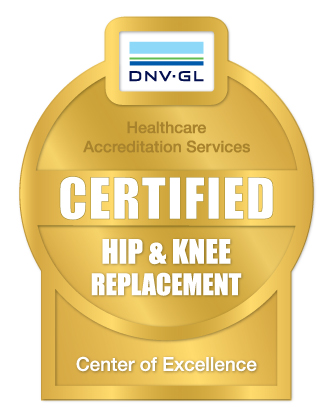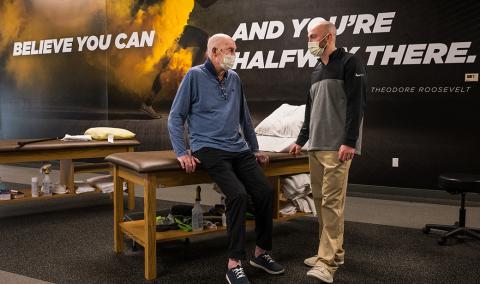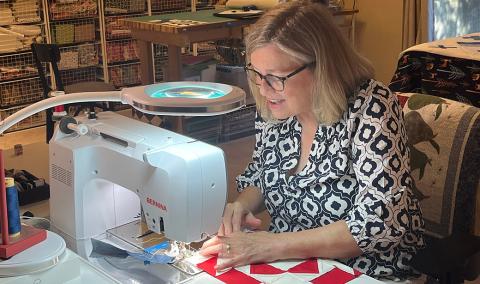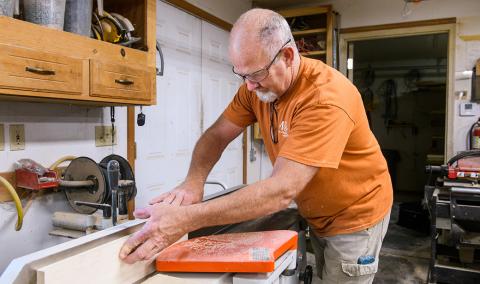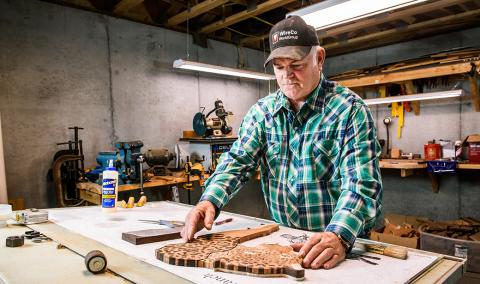At MU Health Care, knee replacement surgery is a personalized experience — powered by teamwork, innovation and experts who specialize in knee care.
Knee replacement surgery replaces worn or damaged parts of the knee with artificial components to relieve pain and restore movement. It’s often recommended when arthritis or injury makes walking, climbing stairs or daily tasks difficult.
At MU Health Care, we perform a high volume of both total and partial knee replacements. Our team includes orthopaedic surgeons, physical therapists, sports injury specialists, nutritionists and more — all working together to support your recovery. Whether you’re just starting to explore surgery or seeking a second opinion, we can help you take the next step with confidence.
Types of Knee Replacement Surgery at MU Health Care
Your care team will help you decide which approach to knee replacement is best for your needs, goals and anatomy.
Total Knee Replacement
This procedure replaces all three compartments of the knee joint — the patellar component (kneecap), femoral component (part of the thigh bone) and tibial component (part of the shin bone). It’s most often used when arthritis has damaged the entire knee. Our surgeons use minimally invasive techniques when possible and advanced technology (including robotics) to maximize precision.
Partial Knee Replacement
Partial knee replacement surgery replaces only one part of the knee. Patients may qualify for this procedure if damage is limited to a single compartment. Partial replacements offer a shorter recovery time and often feel more like a natural knee.
Our Approach to Knee Replacement Surgery
Every knee replacement at MU Health Care is tailored to the individual. Your journey begins with imaging, a full physical exam and medical history review. Your orthopaedic surgeon will explain whether a total or partial knee replacement fits your needs. Advanced planning software and 3D mapping help us personalize your care before the first incision is made.
Our team of specialists from different fields can guide you through the knee replacement process:
- Physical therapists help reestablish your mobility and build your strength before and after surgery.
- Dietitians support healing and reduce inflammation.
- Orthopaedic rehabilitation specialists coach post-op movement.
- Behavioral health providers help ensure emotional readiness.
- Joint health experts help you adjust to any lifestyle changes needed before or after surgery.
We work as one team to guide you from preop through recovery.
Benefits of Knee Replacement Surgery
Knee replacement surgery can relieve chronic pain and improve your ability to move comfortably. When performed at MU Health Care, you can also benefit from:
- Smaller incisions and less soft tissue damage: Our minimally invasive techniques mean shorter hospital stays and faster recovery.
- More natural movement: Partial knee replacements often feel more like your own joint, with a quicker return to activity.
- Custom implants that fit your anatomy: 3D-printed guides and virtual imaging software allow us to create precise surgical plans tailored to your body.
- Robotic surgery: Robotics helps execute the most accurate and precise surgical techniques.
- Lasting results: Patients often report 10+ years of joint function.
What to Expect With Knee Replacement Surgery
Before knee replacement surgery, you’ll attend a preop appointment to review medications, complete any necessary testing and discuss care planning. You may also participate in our Joint Health Program to build strength and improve your recovery outlook.
On surgery day:
- You’ll arrive early and meet with your surgeon and anesthesia team.
- The procedure typically lasts 1-2 hours.
- You may stay one night in the hospital or go home the same day.
After surgery:
- Physical therapy begins right away, including walking and range-of-motion exercises.
- Outpatient rehab usually starts within a few days after knee replacement surgery.
- Your care team will stay in touch to monitor your recovery and support your healing.
Recovery timelines vary. You may be able to return to low-impact activity in 6-12 weeks. Your care team will let you know what to expect based on your age, activity level and goals.
Why Choose MU Health Care for Knee Replacement Surgery
Choosing where you have your knee replacement surgery is just as important as deciding to have it. Here’s what sets MU Health Care apart:
- Experts in knee replacement: Our orthopaedic surgeons specialize in knee replacement procedures.
- Custom surgical planning: We sometimes use 3D-printed guides and AI-assisted software to design procedures around your anatomy.
- Complete care under one roof: From imaging and nutrition to physical therapy and mental health support, all your care happens in one location.
- Leaders in research: Our team participates in national clinical trials, trains the next generation of doctors and surgeons and tracks long-term surgical results through PatientIQ.
Related Conditions & Treatments
- Chiropractic Care
- Bone Density DXA Scan
- Elbow Pain
- Foot and Ankle Pain
- Bone Health Program
- Hand and Wrist Pain
- Hip Pain
- Joint Health Program
- Knee Pain
- Limb Preservation Program
- Musculoskeletal Tumors
- Orthopaedic Rehabilitation
- Orthopaedic Trauma
- Pediatric Orthopaedics
- Physical Therapy
- Regenerative Orthopaedics
- Sarcomas
- Shoulder Pain
- Sports Medicine
- Carpal Tunnel Syndrome
- Hip Arthritis
- Osteoporosis
- Osteoarthritis
- Knee Replacement Surgery
- Ankle Replacement Surgery
- Hip Replacement Surgery



